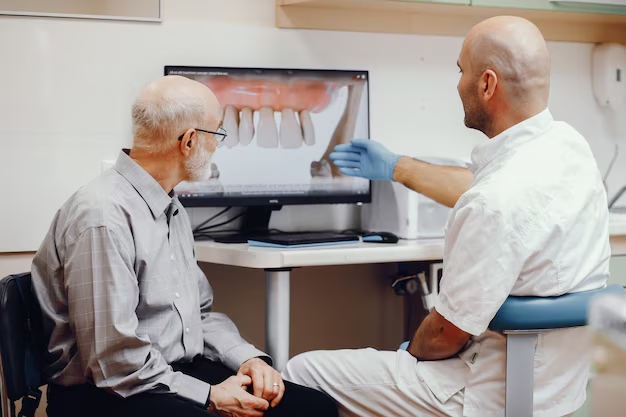Your Guide to Does Medicare Pay For Tooth Extractions
What You Get:
Free Guide
Free, helpful information about Medicare Insurance and related Does Medicare Pay For Tooth Extractions topics.
Helpful Information
Get clear and easy-to-understand details about Does Medicare Pay For Tooth Extractions topics and resources.
Personalized Offers
Answer a few optional questions to receive offers or information related to Medicare Insurance. The survey is optional and not required to access your free guide.
Does Medicare Cover Tooth Extractions? Here's the Inside Scoop
Navigating the complexities of Medicare coverage can be daunting, especially when it comes to dental procedures. Tooth extractions—a common dental need—often raise questions about Medicare's involvement. If you're one of those perplexed about whether Medicare will foot the bill for extracting a troublesome tooth, read on for a clear and concise answer, along with options for financial support should Medicare fall short.
Medicare's Stand on Dental Care
Traditionally, Medicare does not cover most dental care. This includes routine dental visits, cleanings, fillings, dentures, and, yes, most tooth extractions. Original Medicare (Part A and Part B) targets broader healthcare needs, not typically extending to oral health unless it is medical or injury-related.
Exceptions to the Rule
There are, however, a few exceptions where Medicare could aid with dental procedures:
- If a tooth extraction is required in preparation for a covered medical procedure, like jaw surgery, hospitalization may be covered.
- Medicare Part A might cover a tooth extraction if:
- It is conducted in a hospital setting as part of an emergency or complicated dental process.
Consider Medicare Advantage Plans
Medicare Advantage (Medicare Part C) plans, provided by private insurance companies, often cover additional benefits, including some dental services. Beneficiaries should examine plans meticulously to verify if it includes dental extractions, as coverage can vary significantly.
Exploring Financial Assistance for Dental Procedures
So what happens if Medicare doesn’t cover your tooth extraction? Don't worry—there are multiple avenues to explore for financial relief:
Government Assistance Programs
For those on low incomes, many states offer Medicaid programs that include dental coverage. Qualification criteria differ state by state, but it can be a valuable resource for those needing oral health services.
Community Health Clinics
Community health centers and dental schools often provide services on a sliding scale based on income, sometimes even free of charge. Leveraging these services can significantly reduce out-of-pocket expenses.
Financial Aid and Payment Plans
Many dental clinics provide payment plans to break down costs into manageable monthly payments. Discuss this option up front with your dental provider.
Dental Savings Plans
For those without insurance, dental savings plans offer reduced rates on dental work in exchange for an annual membership fee. These can be a viable alternative to insurance when it comes to steep dental bills.
Additional Resources for Financial Aid
Here’s a quick reference table of programs and opportunities that may help mitigate the cost of dental procedures if Medicare doesn’t cover tooth extractions:
- Medicaid: Offers comprehensive dental coverage in many states for eligible low-income adults. 🏥
- Community Health Centers & Dental Schools: Available nationwide providing low-cost or free dental care. 🏫
- Flexible Spending Accounts (FSAs) or Health Savings Accounts (HSAs): Use pre-tax dollars for dental expenses. 💰
- CareCredit: A reputable healthcare credit card offering flexibility in dental payments. 💳
- Dental Grants: Some non-profit organizations provide grants to help cover costly dental procedures. 📜
Navigating the complexities of Medicare dental coverage can be overwhelming. However, understanding the limitations and knowing where to turn for financial assistance can ease the burden, allowing you to maintain your oral health without breaking the bank.
What You Get:
Free Medicare Insurance Guide
Free, helpful information about Does Medicare Pay For Tooth Extractions and related resources.

Helpful Information
Get clear, easy-to-understand details about Does Medicare Pay For Tooth Extractions topics.

Optional Personalized Offers
Answer a few optional questions to see offers or information related to Medicare Insurance. Participation is not required to get your free guide.


Discover More
- Am I Elgible For Medicare
- Am I Enrolled In Medicare
- Am I Qualified For Medicare
- Are Adult Diapers Covered By Medicare
- Are Chemotherapy Drugs Covered By Medicare Part d
- Are Colonoscopies Covered By Medicare
- Are Covid Tests Covered By Medicare
- Are Cpap Machines Covered By Medicare
- Are Cpap Supplies Covered By Medicare
- Are Dental Implants Covered By Medicare
